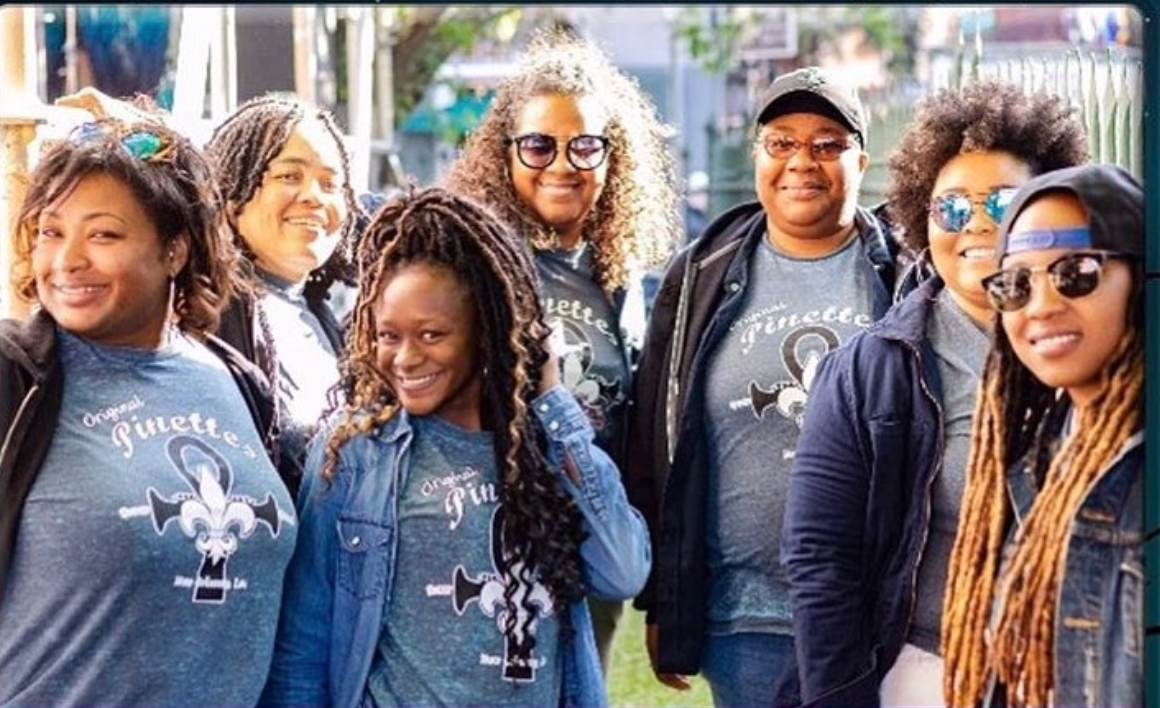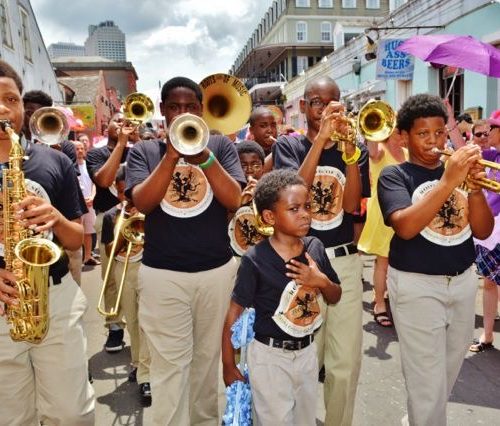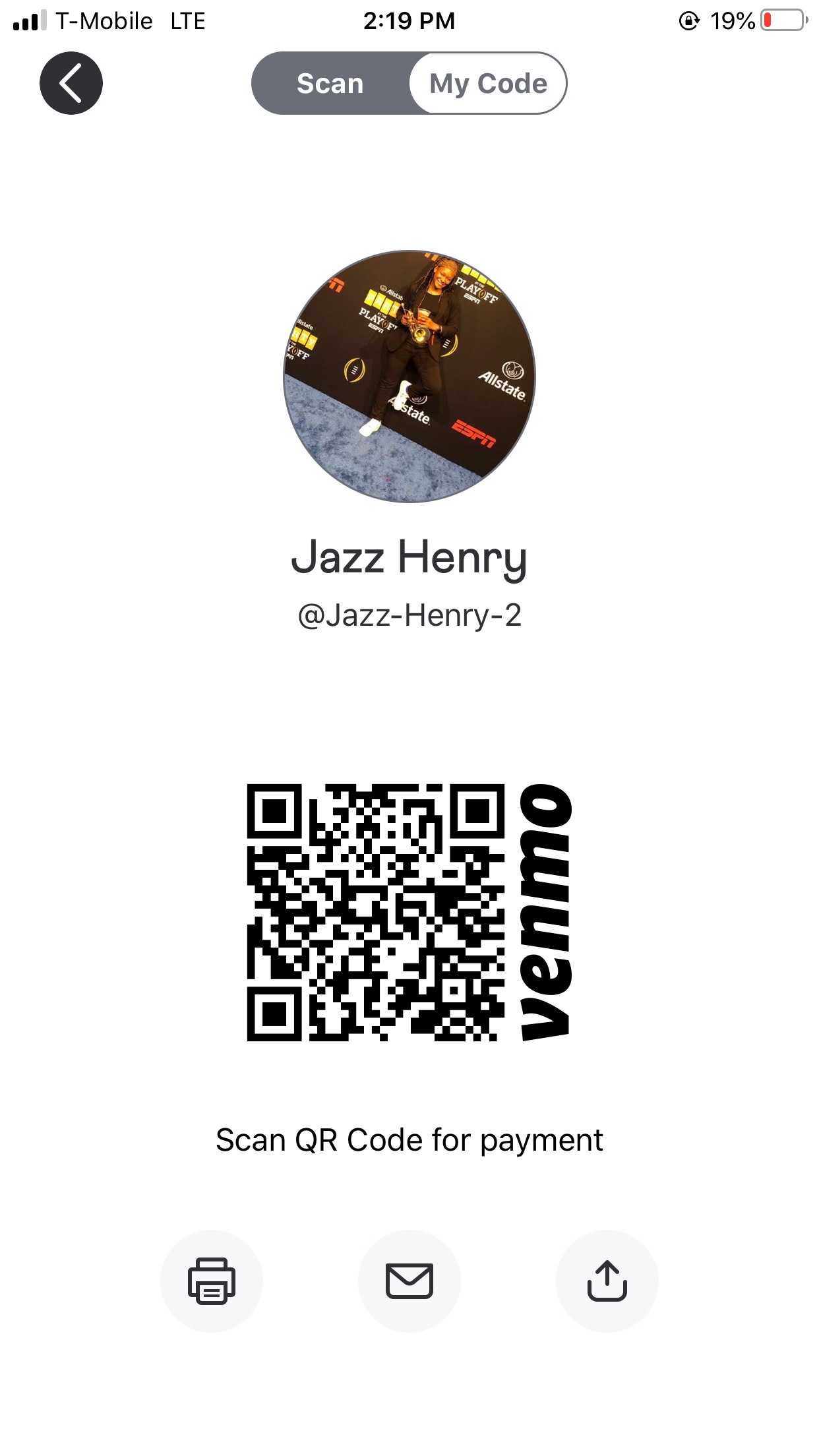
(The Original Pinettes Band, Jazz Henry is in the front row with a blue denim shirt; Credit: The Original Pinettes Instagram)
Jazz music is at the heart and soul of the New Orleans community. The people and the culture fill the city with magical sounds of brass bands, trumpet players, and second lines, and Jazz Henry is a perfect example of this rich history and diverse culture. Born and raised in New Orleans, Henry has been playing instruments from the young age of 12. She is a member of the only female brass band in the world, The Original Pinettes Brass Band. They have a residency at Bullet’s Sports Bar in the Treme, a historically black neighborhood in the 7th Ward that is known for its soul music.

(Roots of Music in a Second Line; Credit: changemakersplayground.com)
Jazz Henry is proud of her musical roots, and her education of music started at Roots of Music. This program empowers the youth of New Orleans through music education, academic support, and mentorship, while preserving and promoting the unique musical and cultural heritage of our city. The program prepared her physically for the stamina to walk in a marching band, but Henry prepared herself mentally. Henry’s relationship with the program went beyond marching band education though, because the founder of Roots of Music introduced her to her future band members, the Pinettes. Henry is a spokesperson for “Roots,” as she calls it, because she has seen such success in the music industry in New Orleans, and she wants to encourage the next generation to pursue their musical goals.
Henry accredits her continued success and passion with music to her past. Corey Henry, Jazz Henry’s father, is a well-known musician who has performed with some of New Orleans’ best. Growing up around him, Henry had daily inspiration to pursue her musical goals, and the sky truly was the limit. Even as an adult, Henry’s father wakes her up at the crack of dawn to make music together. It is their love language. Music has consistently had a role in Henry’s life, from her childhood to her adult life, and she credits her past with the success she has today being a member of The Original Pinettes Brass Band.
The Crescent City is Henry’s biggest inspiration. The history of jazz music is strongly linked with African American communities in New Orleans, and so the music genre creates a sense of place. One cannot think about jazz music without thinking of New Orleans, and vice versa. The two go hand-in-hand. This relationship between the city and the music is evident in both original songs by the Pinettes and their covers, because the music stays true to the history of the city. The motif of New Orleans is not only present in Henry’s work with music, but also in her side projects, such as acting, film projects (both her own and work she does for other directors), and a dessert business with her friends. Each of these projects take place in New Orleans where she is strongly influenced by her family, New Orleans culture, and her main job as a musician.
During the global pandemic of COVID-19, Henry has continued to create new music throughout the quarantine by herself, with her band, and with her father. In order to remain artists during a time when live music cannot be heard, the Pinettes hold live streams on social media to stay engaged with their fans. They are also writing an album that is planned to be released in 2021. While Henry has not said this directly, it can be assumed that her vision of New Orleans and live music is that if there’s a will, there’s a way. New Orleans has seen so much and struggled through so much, so music is the city’s lifeline. Even though there have been a few hiatuses in which music leaves the streets of New Orleans, it always returns, and will do so after the COVID-19 “moment” has finished. Nothing will ever take jazz music away from New Orleans.
Second line parades have a long New Orleans history rooted in jazz, specifically jazz funerals led by the leading band, the first line, followed by the second line for the celebrants. The modern second line celebrations happen on Sundays; where the band and people dance together. New Orleans music is so specific to the city and Henry tells us, “you’re never going to find music like this,” because the vibe is unmatched. “Only in New Orleans” is the Tulane motto, and that rings true when it comes to music and culture. Second line brass bands are known for their bright sounds and spirit, and Henry loves the soul of it because it brings a sense of community.
Henry plays the trombone and clarinet, but her favorite instrument is the trumpet because of its fun and upbeat sound. She claims that she’s one of the more fun players in the Pinettes; you can find her “hyping” up the crowd and her bandmates, dancing around with a cowbell or tambourine in hand. Her own energy and animation mimics that of the passion and life of jazz music. Henry describes how the sound flows through her, letting her body move however it wants. She is free. And wherever there are brass bands, there are people dancing; the music takes over the listeners, melting any tension or negativity. There is a feeling of relief with second lines, because parades are the perfect Sunday tradition, like an experience of going to church. Second lines, and specifically brass bands take their place in the history and culture of New Orleans.
Deeply fixed in jazz music and brass bands, New Orleans remains centralized around music. The brass band in the second line acts as an expressive outlet for Jazz Henry, she tells us “Dancing to the music is soul-touching.” The second line creates a positive space for the New Orleans community that Henry thrives off of. Her community and the culture of New Orleans created a space without judgement, so Henry can be her true self. The New Orleans culture, particularly the second line, shaped the expression of Jazz Henry’s music and is an integral part to her sound giving way to her vibrant character.
Jazz Henry represents an eccentric artist through her solo music and her music with The Original Pinettes Brass Band. The energetic and entertaining visual of Jazz’s performances and music embodies what Francesca Roysters claims as “an eccentric performers’ ability to locate themselves in a freedom of movement in an otherwise constraining situation,” in Sounding Like a No-No (15). Henry finds this freedom in her dancing, interacting with the audience, and constant energy during her performances. In addition to Jazz’s eccentric spunk and energy, The Original Pinettes Brass Band itself exhibits eccentricity through its crossing of music boundaries. As a generally jazz oriented brass band, they have additionally covered songs of different genres, which contributes to Royster’s claim of “eccentricity creat[ing] a space for dreaming, a declaration of fun, funk, play and pleasure” by allowing their listeners and fans to express themselves in any way. Jazz Henry exemplifies an unmatched energy and dedication to her music and the music of her band (33). (Bailey)
Jazz Henry’s music and energy can be found all around New Orleans. She stands out in a crowd because it is obvious to an outsider how much she truly loves music and New Orleans culture. Check her out on YouTube for her performances and interviews or on the TV show Treme on HBO! If you’re looking for the epitome of New Orleans culture and grind, look towards Jazz Henry! (Hannah)
You can donate to Jazz’s tip jar here:

 NOLAbeings
Multimedia artist Claire Bangser created NOLAbeings as a portrait-based story project that marries...
NOLAbeings
Multimedia artist Claire Bangser created NOLAbeings as a portrait-based story project that marries...
 Data corner: Adobe Suite (create a PDF, social media graphic, presentation, edit a photo and video
Data corner is where you go to work with analytics and top tech skills. It takes on everything from PERL and SQL to Canva and Sprout Social.
Data corner: Adobe Suite (create a PDF, social media graphic, presentation, edit a photo and video
Data corner is where you go to work with analytics and top tech skills. It takes on everything from PERL and SQL to Canva and Sprout Social.
